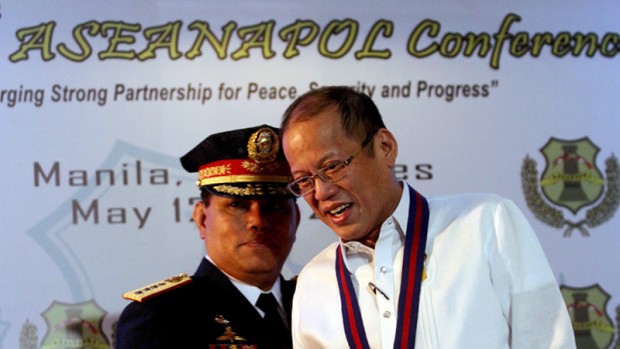What went before: SMS between Aquino, Purisima

President Benigno S. Aquino III and resigned Philippine National Police (PNP) Director General Alan Purisima. Malacañang Photo Bureau
Earlier this month, the Senate issued a subpoena to telecommunication companies to provide transcripts of text exchanges between President Benigno Aquino III and Director General Alan Purisima, the former Philippine National Police chief, on Jan. 25, the day 44 members of the PNP’s Special Action Force were killed in a gun battle with Moro rebels after a bungled counterterrorism mission in Mamasapano, Maguindanao province.
Text messages between Mr. Aquino and Purisima released by Malacañang in late February showed the President was getting information from the suspended PNP chief, not from an officer within the official PNP or Armed Forces of the Philippines chain of command. It was unclear, however, whether the Palace released all of the text messages between Mr. Aquino and Purisima.
The Senate subpoenaed the text messages from the telcos to compare the contents of the transcripts of Purisima’s SMS exchanges with the President that the former PNP chief had submitted.
Speaking in the Senate, Purisima read into the record his exchanges with the President from 5:45 a.m. on Jan. 25, when he informed the President about the killing of Malaysian terrorist Zulkifli bin Hir, alias “Marwan,” to 6:20 p.m., when he texted Mr. Aquino about the heavy casualties suffered by the SAF.
In between, Mr. Aquino inquired if the authorities were back to square one with the escape of Marwan’s Filipino associate, Basit Usman, and made clear that the terrorist “should not get away.”
Article continues after this advertisementAfter Mr. Aquino texted at 10:16 a.m., it was only Purisima who sent messages between 11:38 a.m. and 6:20 p.m.
Article continues after this advertisementPurisima updated the President on the killing of Marwan and the SAF clash with the Moro rebels.
In an early text, Purisima told the President that the containment forces who were battling guerrillas from the Moro Islamic Liberaton Front (MILF) and the Bangsamoro Islamic Freedom Fighters (BIFF) were “supported by mechanized and artillery support.”
But this was apparently not the case, because the tanks and artillery were not yet deployed at that time, and these were not fully used because of the marshy ground and the lack of a forward observer, the senators investigating the clash noted.
Purisima told the Senate he texted Mr. Aquino at 5:45 a.m. on Jan. 25 that Marwan had been killed but that his body had to be left behind, and that one SAF trooper was wounded in the operation.
Based on his text message to Purisima, Mr. Aquino knew details of the operation and believed that police and military units were available to assist 160 SAF commandos carrying out the mission.
“If I remember correctly, 160 SAF troopers were directly involved in this operation plus provisions for other PNP and AFP units to assist,” Mr. Aquino said in his 7:59 a.m. text to Purisima.
“The terrain is flat and clear as opposed to upland forested or jungle terrain. Why could they not contain and/or overwhelm the 15-20 members opposing force? Are they still in contact with the two other targets? If not and the opposing force has escaped, are we now back to square one?” the President asked.
At 8:17 a.m., Purisima replied: “They are presently in contact with reinforcing elements from BIFF. The containment forces are the ones in contact right now. They are supported by mechanized and artillery support, Sir.”
Purisima testified that he based his message to the President about mechanized and artillery support on an SMS to him by Lt. Gen. Rustico Guerrero, chief of the AFP Western Mindanao Command.
After receiving the call to assist the SAF troopers under fire, Guerrero told Purisima that there was coordination on the ground, and that “tank, infantry and artillery support are made available.”
But in the Senate, Guerrero said his text message meant only that the tanks and artillery were in place, and did not mean these had been deployed.
In his last text to the President sent at 6:20 p.m. Purisima said: “Sir, latest report from operating elements in Maguindanao states that the security elements who were engaged by BIFF/MILF elements suffered heavy casualties. They were reportedly overrun. CCH and international monitoring team are in the area retrieving casualties. The main effort is still in the process of rendezvous with other SAF and AFP elements.”
Responding to the Senate subpoena, Smart Communications said its system did not allow it to retain the contents of text messages.
Telcos later said they did not store their subscribers’ messages. They said they kept records of the time and number of text messages sent and received by subscribers, but not the contents.
Industry officials told the Inquirer earlier that while it is theoretically possible to intercept and read subscribers’ text message exchanges, telcos do not.
They said that as a matter of policy, telcos do not read or store messages because of the high volume of message traffic in the Philippines.
Monitoring and storing all messages would entail significant costs, they said.
Source: Inquirer Archives
RELATED STORIES
Aquino approves release of texts